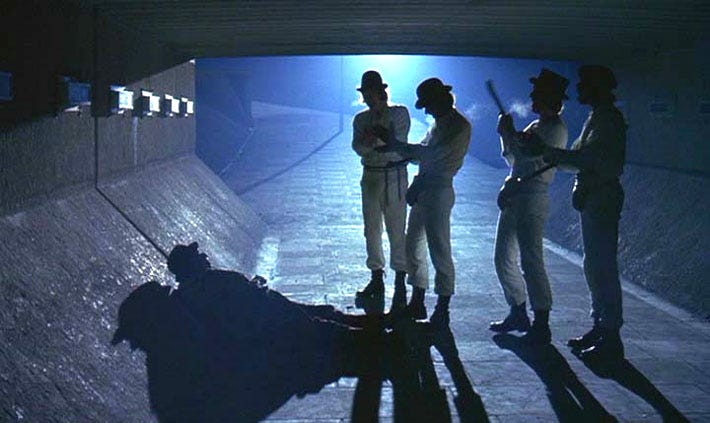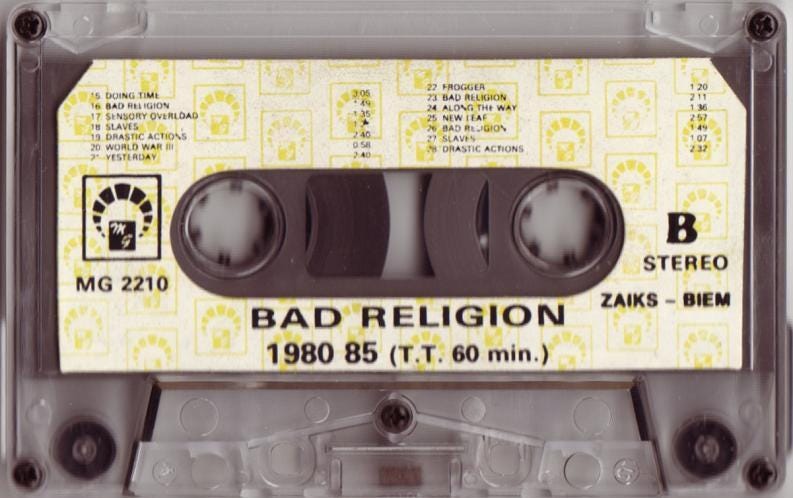We are now less than four months away from the publication of Do What You Want, my book with Bad Religion. Like everyone else with a book coming out during the global pandemic and it’s aftermath (he said hopefully), we’re scrambling to figure out what we can do to make sure that fans find out about the book.
When I was researching and writing Do What You Want, I discovered that Bad Religion fans are really passionate about Bad Religion. They talk about the band in ways that punk rockers don’t typically talk about other bands, like the Misfits for example. No disrespect to the Misfits (or their simple-minded fans) but the Bad Religion fans I spoke with almost always volunteered a story about the song or album that got them into the band. Sometimes the introduction came through skateboarding. Sometimes it was an arresting lyric that did the trick. Sometimes it was an older sibling or friend who was slightly more clued in to the complexities of the world. But they always had a story about the way they were changed.
When I used to teach English composition, I was always trying to get my students to write about an experience that changed them—usually without much success. But now I had people volunteering these stories over and over again. It was remarkable. It is remarkable.
The other thing I learned is that Bad Religion has been together for so long that very few people know the band’s whole story. They might know a little or a lot about the period when they first got into Bad Religion, and then go back to see what else they’d missed or return to the band here and there over the years. But these intersections occurred at different points in the band’s history and in the fan’s lives because how could it be any other way? This makes these stories more interesting because they’re all different. It wasn’t ten thousand dude bros yelling “Bro Hymn” at me.
So I thought I would reach out to some of these Bad Religion fans and ask them about their favorite song and/or album. Some of these people I’ve known for a while but didn’t know they were fans of the band. Some of these people are friends I’ve made through the book. And some of these people I barely know at all.
I’ve got a bunch of interviews ready to go and I’m going to make it a regular feature of this weekly newsletter until the book comes out on August 18, 2020. At the end of the day, this book is for the fans. Why not turn the microphone, so to speak, on them?
I’m starting with my friend Bud Smith, a writer from New Jersey, because his response is one of the longer ones I’ve gotten that encapsulates what it means to find something you love and not even know you were searching for it.
Bud Smith is the kind of writer I find hard to classify, so I usually don’t try. To call Bud a “natural storyteller” is a disservice to his art because he works really hard at it. He’s got a probing mind, the kind that will take him on a quest if need be, and we need more people like that. He recently completed a serial novel called Good Luck that exemplifies what I respect about his approach to art and life and living as an artist. He’s also written book type books. You don’t need a degree, or a fancy beret, or to be a blue collar stud (like Bud) to be an artist; all you need is a desire that never burns out. That’s Bud.
JIM RULAND: What’s your favorite Bad Religion song and/or album?
BUD SMITH: I can’t remember a punk band I knew before Bad Religion. I’m trying. I had no idea about Sex Pistols or Stooges or any of that. It might have been when Green Day came out with Dookie in ‘94 that I learned it was a thing they weren’t even ripping off right (which, like, whatever). I never thought their music was more than a loud poppy thing you sang along to and I don’t know what else, had fun to, danced to, weren’t pretentious about. I was twelve.
My dad had a Sweet record of “The Ballroom Blitz,” I recognized their sprit in Green Day and a kind of demented Bay City Rollers was there too. But even at twelve it was clear what was mastered and what was not. Stone Temple Pilots were not half as good as Nirvana. Ghostbusters was leaps and bounds above The Monster Squad. Though Steven King sold a zillion more copies and Robert R. McCammon was writing Roger Corman-esque rip-off books, McCammon’s rip-offs were better, and how could you explain it? I had no word for it yet. I didn’t understand counterculture, or fuck it, or burn-it-all-down-cause-we’re-bored, or burnt-out, art damaged, strung out, nihilistic, on and on and on.
I can’t say I even had heard much of the Ramones. I was twelve. The radio was playing grunge and some classic rock and they must have been playing “I Wanna Be Sedated.” I just never totally connected the Ramones to the song. It’s so short I feel like I can’t be blamed. And same with “Blitzkrieg Bop.” It didn’t have the advantage of being a parody on barbershop and other ‘50s culture that had won over my parent’s generation in the late ‘70s. At twelve, I liked listening to Buddy Holly and thought the Ramones were kinda ripping him off and didn’t see how Green Day was ripping them off. Or I didn’t understand how everything influenced everything else and it all meant something. The adults around me were going crazy about Shania Twain and still playing Phil Collins, on loop.
I got the Green Day CD from the mall. I remember thinking when I listened to it in my room, alone, that it was a new thing I couldn’t quite place and I was wide-eyed and happy for it, like how you could kind of get away from the completely popular and safe stuff at the time—I don’t know, U2 or something—and there was the possibility of something weird happening. Green Day would sing about jerking off and I thought they were English because the singer sang in a seemingly lazy English accent.
I read all the record reviews for Dookie. And some of the detractors led me to listening to the bands they felt Green Day had ripped off. Just that lost and looking around thing you do when you don’t have a job. When you’re twelve, thirteen, fourteen, fifteen, that feeling. That looking around feeling. When you find Clockwork Orange and you say, “Thank God!”

I came across Bad Religion by reading record reviews for Dookie and the reviewers would be like, Hey if you’re gonna listen to this and pretend you like it, which is impossible, at least listen to the original source material, and since “21st Century (Digital Boy)” was on MTV and Stranger Than Fiction was out too, I took my allowance money to the store and bought that. I liked it. It was fun too. I learned a lot of new words.
But then I read reviews about that album and the critics panned that too. They said to listen to No Control and Suffer, which I couldn’t find.
But the girl at the record store said she would trade a tape of a Pearl Jam bootleg for a great Bad Religion comp. So I gave her a tape of Pearl Jam Contra and she gave me Bad Religion’s ‘80-’85 and that kinda kicked open a new door. I wore that tape out. I liked every song. But I didn’t understand my favorite “song” was three songs until many years later. That was “Along the Way”—“New Leaf”—“Bad Religion.” I thought it was amazing. I’d been used to listening to concept progressive rock albums like Tommy by The Who and Thick as a Brick by Jethro Tull and still wasn’t quite sure what punk really was yet. And even all these years later, the way Bad Religion mixed those three songs together, I believe they might have thought they meant more running into each other, the way a poet has references across an entire book of poems tying it all together and might say later, “Oh who me? I’m just a poet. Nothing more about it.” Or hey, “I’m just a punk rocker. Nothing more about it.” But it meant more to me then and it means more to me now. And I can’t say how many times I’ve listened to those three songs. I’ve just ordered the record again because it’s destroyed, worn out.

I never really felt I was better than Green Day, but soon I’d blinked and found Fugazi and Bad Religion and on you go through a lifetime. And I can’t even begin to say where those bands I found after that pointed me toward literature and film and any other kind of art. It’s been a lifetime of looking around and questioning and deciding what’s important right now, in the weird space of time that keeps shifting.
Do you have a story about your favorite Bad Religion song and/or album that you’d like to share? Drop me a line! Also, what should I call these interview? And by all means share this story with all of your punk rock friends.




You don't understand Misfits cuz you're not a true ghoul, Jim